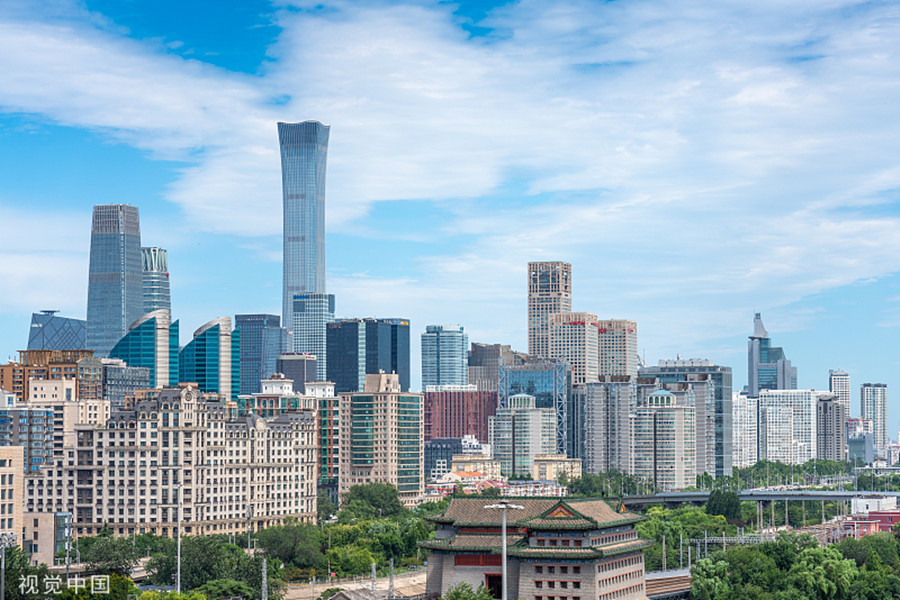China to remain key engine for global growth

A view of Beijing's CBD area. [Photo/VCG]
Outlook: More reform, opening-up measures expected to be announced
China is likely to register strong economic recovery this year, amid macroeconomic policy adjustments and unwavering reform and opening-up efforts, said senior economists, trade experts and business leaders.
The efforts will be characterized by aligning with high-standard international trade and economic rules, establishment of a national unified domestic market, and nurturing of new productive forces, they said.
The analysts also said they believe that the country will remain a key growth engine for the global economy in the coming decades, thanks to its sound long-term economic fundamentals, bringing golden business opportunities for foreign investors.
They made the remarks while dismissing views expressed in some Western media suggesting that China's economic prospects were worsening and that the country was reluctant to advance reform.
Liu Jieyi, spokesman for the second session of the 14th National Committee of the Chinese People's Political Consultative Conference — China's top political advisory body — told a news conference on Sunday that he took a rosy view of China's economic prospects, saying that the country enjoys a solid foundation and favorable conditions for promoting high-quality development.
China's economic recovery is poised to be further consolidated and strengthened, Liu added.
Growth potential hailed
In an exclusive interview with China Daily, Justin Yifu Lin, dean of Peking University's Institute of New Structural Economics, said that China has the potential to grow at 8 percent annually in the coming decades. The Chinese economy can grow beyond 5 percent this year if the government adopts more proactive fiscal and monetary expansion policies, he said.
"China will still be the most dynamic growing economy, make the most contribution to global growth, and provide a driving force for global growth and stability," said Lin, who is also vice-chairman of the Committee on Economic Affairs of the National Committee of the CPPCC.
The country is capable of adopting more proactive countercyclical fiscal and monetary policies, and providing more resources for private enterprises — the main players in China's foreign trade sector — to offset the impact of the global economic slowdown and falling external demand, and to boost domestic investment and consumption, said Lin.
He added that China is unlikely to experience what Japan did after the late 1990s — after Tokyo abandoned its industrial policy under external pressure and failed to achieve major breakthroughs in basic research and technologies — as long as China promotes technological innovations and industrial upgrades and creates more investment opportunities for enterprises.
Meanwhile, the latest data from the National Bureau of Statistics showed on Friday that China's nonmanufacturing activities expanded at a faster pace.
The country's official purchasing managers index for the manufacturing sector fell to 49.1 in February from 49.2 in January, below the 50-point mark that separates contraction from growth.
Meanwhile, the nonmanufacturing PMI came in at 51.4 in February, up from 50.7 a month earlier. In addition, the country's official composite PMI, which includes both manufacturing and nonmanufacturing activities, came in at 50.9 in February, the same as January.
Wei Jianguo, former vice-minister of commerce, said that China is expected to announce more measures to deepen reforms and expand high-level opening-up during the two sessions, the annual gatherings this week in Beijing of the nation's top legislative and political advisory bodies, to boost confidence of all enterprises and fuel economic growth. "
Key measures are expected to include those accelerating the establishment of the unified domestic market, facilitating development of new productive forces and enhancing the talent education system," he said.
He said that China is on the fast track to upgrade industrial and supply chains with green, digital and intelligent transformations, as it has prioritized nurturing new productive forces.
Tian Xuan, vice-dean of Tsinghua University's PBC School of Finance, said that China's fast economic expansion, with an average annual growth rate of 9.9 percent over the past three decades, was a miracle.
He said the country has ample room for macroeconomic maneuvering, adding that drafting a law on promoting the private economy would also bolster the sector's confidence and spur private enterprises' contributions to the overall economy in the areas of innovation, employment and tax revenue.
Multinational companies have recently reiterated their confidence in the Chinese economy and their development prospects in the country.
Marc Horn, president of Merck China, said that in 2024, the company will continue to expand its footprint in China and seize the vast opportunities that lie ahead.
In the medium and long term, he said, "I am optimistic that China's economy will largely benefit from the current ongoing economic reforms, which target a Chinese path to modernization driven by industrial upgrading, high-tech development and green initiatives".
Copyright © The National Committee of the Chinese People's Political Consultative Conference.
All rights reserved. Presented by China Daily.
京ICP备08100501号-1

